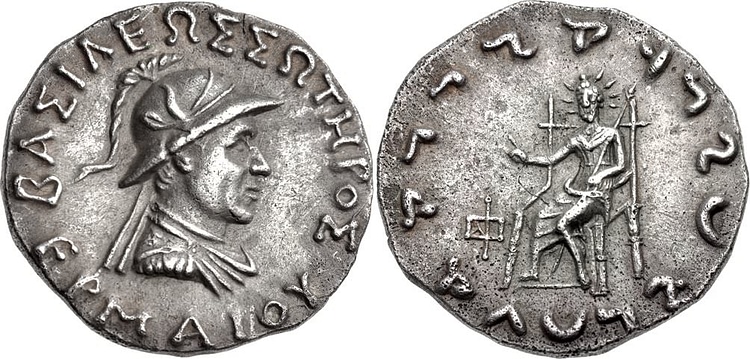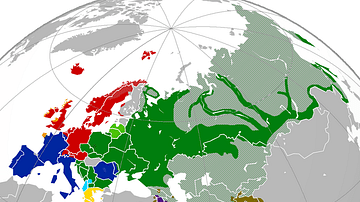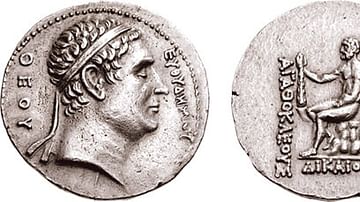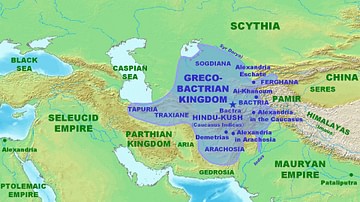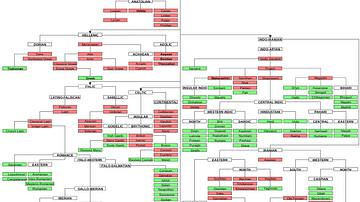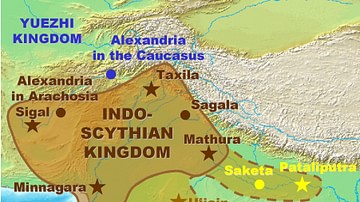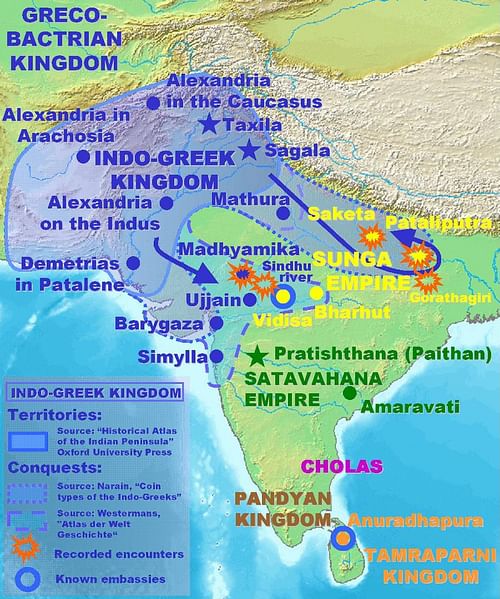
The first Indo-Greek kingdom appeared circa 190 BCE may when the Greco-Bactrian king or (general for his father) Demetrios was busy in India, when his Indian possessions were divided between several kings, probably firstly in order to better govern them but then due to civil war. The term “Indo-Greek” is generally used because these kingdoms were almost always separated from Bactria and thus differed politically from the Greco-Bactrian kingdom.
These kingdoms, in which there were already some Greek settlers called Yonas, took more and more Indian characteristics, becoming truly unique political entities with a mix of Greek and Indian culture, at least for the ruling elites. Indo-Greek kingdoms timeline is very approximate. Between 190 BCE and circa 165 BCE, Greek possessions in India were divided between several Euthydemid kings which fought among themselves and their Greco-Bactrian neighbors. These kingdoms extended to Western Punjab and had Indians of Sunga dynasty as neighbors.
Circa 165 BCE the Greco-Bactrian rebel Eucratides invaded the Indo-Greek kingdoms and, defeating Antimachos II, succeeded to take control of most of the Indo-Greek possessions. Unluckily for him, Menander, his last Euthydemid enemy, pushed him back to Bactria circa 155 BCE. Thus the Indo-Greek kingdoms were safely under Euthydemid rule for the next 25 years. In this time Menander extended Greek rule as far as Paliputra (today Patna, in northeast India), but fell in a civil war.
However circa 130 BCE, the Euthydemid kings were chased away from Bactria by the Yuezhei and settled down in strength in the Indo-Greek territories. From 130 BCE to 80 BCE, numerous Indo-Greek kings ruled in India, often in little kingdoms, fighting among each other, while Arachosia was lost to the Sakas. Some kings seem to have nearly succeeded to reunite these areas, like Eucratids Philoxenos and Diomedes, but finally failed. One Euthydemid queen, Agathokleia, made a strong regency for her son Strato in this time too. Yet at the turn of the century the Indo-Greek regions were highly fragmented.
The disruptive element came circa 80 BCE, when the Saka king Maues attacked the Indo-Greek kingdoms. He won against several Euthydemid and Eucratid kings, taking the Paropamisadae, Gandhara and Western Punjab. Against this invader, the both dynasties forged an alliance under the rule of Amyntas, whose resistance in eastern Punjab saved Indo-Greek kingdoms, and by circa 65 BCE the Indo-Greek kings regained their kingdoms and their rivalry.
The final moments of Indo-Greek history are written in civil wars once more, with the quick loss of all the Western possessions to the Indo-Saka kings. The last Indo-Greek king Strato II ended his rule circa 10 BCE, vanquished by the Indo-Saka king Rajuvula.
The Indo-Greek kings and kingdoms are absent in the Greek imagination, because of the estrangement from the Greek world and the cut of political links due to Parthian and Sakas presence between India and Greece. However these kingdoms appear to have strongly influenced their Indian subject and Indian or nomad neighbors, as the nature of Indian art from the period, as well as the mention of the Yonas in Asoka's edicts suggest.
